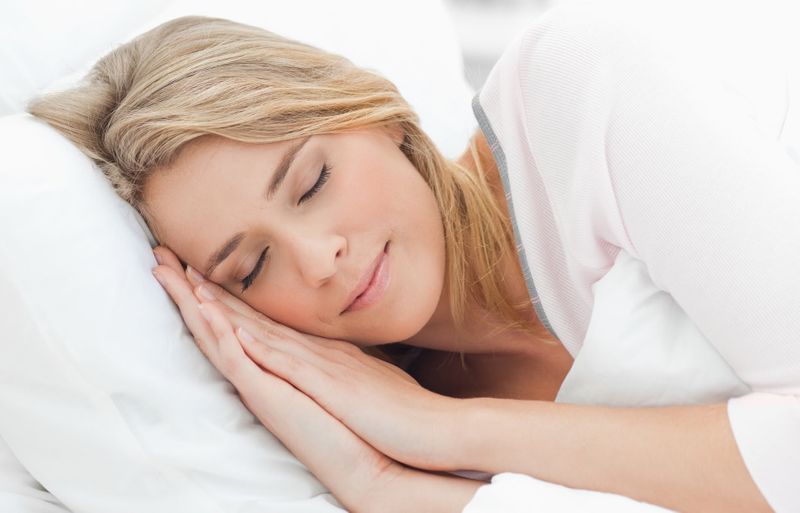Unlocking the Secrets of Early Morning Wakefulness: What It Means When You Wake Up at 3 or 4 AM s2

Stress and Anxiety
One of the primary culprits behind disrupted sleep is stress. High levels of stress or anxiety can keep your mind racing, making it difficult to stay asleep. When you’re preoccupied with worries or overwhelmed by daily pressures, your brain might decide that it’s time to start the day—well before your body is ready. This results in those early morning wake-ups and can make it challenging to fall back asleep, creating a cycle of fatigue and frustration.
Sleep Disorders
Sleep disorders such as insomnia and sleep apnea are also common reasons why people might wake up during the early morning hours.
- Insomnia: This condition is characterized by difficulty falling or staying asleep, often causing frequent awakenings. Insomnia can leave you feeling unrefreshed, no matter how long you’re in bed.
- Sleep Apnea: Characterized by pauses in breathing during sleep, sleep apnea disrupts the sleep cycle and can cause sudden awakenings. These breathing interruptions force your body into a state of alertness, interrupting deep, restorative sleep.
Hormonal Changes

Hormonal fluctuations, particularly in women going through menopause, can significantly affect sleep quality. As estrogen and progesterone levels change, many women report experiencing hot flashes, night sweats, and other symptoms that lead to waking up in the early hours. This natural shift in hormones can make it difficult for the body to maintain a consistent sleep cycle.
Lifestyle Factors
Your daily habits and routines play a significant role in determining how well you sleep. Several lifestyle factors might contribute to waking up too early, including:
- Caffeine and Alcohol Consumption: Consuming caffeine in the afternoon or drinking alcohol close to bedtime can disrupt your sleep pattern. While alcohol might initially make you feel drowsy, it can interfere with the deeper stages of sleep, leading to premature awakenings.
- Irregular Sleep Schedules: Going to bed and waking up at different times each day confuses your body’s internal clock. A consistent routine helps regulate your circadian rhythm, so irregular patterns can trigger early wakefulness.
Environmental Factors
The environment in which you sleep has a profound impact on the quality of your rest. Factors such as light, noise, and room temperature can all contribute to an interrupted night.
- Light Exposure: Even small amounts of light, whether from street lamps or electronic devices, can disrupt the production of melatonin, the hormone responsible for regulating sleep.
- Noise: Sudden or continuous background noise can startle your brain into waking, even if you’re in a deep sleep.
- Comfort: An uncomfortable mattress, pillows, or even an overly warm or cool room can lead to restless sleep, causing you to wake up earlier than intended.
Physical Health Issues
Chronic pain and other physical health problems can also be the cause of early morning awakenings. Conditions such as arthritis, respiratory issues, or digestive disorders can make it difficult to remain asleep. For instance, pain might signal your body to wake up so you can address the discomfort, while issues like acid reflux can be particularly troublesome during the quiet hours of the night.
Spiritual or Emotional Awakening
Some individuals believe that waking up at unusual hours, such as 3 or 4 AM, can be a sign of spiritual or emotional awakening. According to this perspective, the early morning hours are a time when your inner self is more in tune with the universe, providing an opportunity for heightened awareness and reflection. Whether or not you subscribe to this belief, it’s clear that these moments of wakefulness can offer a unique time for introspection and personal growth.
The Incredible Benefits of a Good Night’s Sleep

Understanding the reasons behind early wakefulness is only one part of the puzzle. Equally important is recognizing the immense benefits that come with quality sleep. A restful night’s sleep does more than just prevent morning grogginess—it is essential for both physical and mental health.
Physical Health and Recovery
During sleep, your body goes into repair mode. Deep sleep, in particular, is crucial for the release of growth hormones, which help repair tissues and muscles. This restorative process is key to recovery from daily wear and tear. Moreover, sleep strengthens your immune system, making you less susceptible to infections and illnesses.
Enhanced Cognitive Function
Quality sleep plays a pivotal role in cognitive performance. When you sleep well, your brain processes and consolidates memories, which is essential for learning and problem-solving. A good night’s rest can boost your concentration, improve decision-making skills, and enhance overall mental clarity. Whether you’re tackling work tasks or engaging in creative pursuits, proper sleep helps keep your mind sharp.
Emotional Well-Being
Sleep has a profound impact on your emotional health. A lack of sleep is closely linked to irritability, anxiety, and increased stress levels. On the other hand, sufficient sleep can help regulate your mood, making you more resilient in the face of everyday challenges. When you wake up feeling rested, you’re better equipped to handle stress and enjoy a more balanced emotional state throughout the day.
Weight Management
Sleep also plays a role in regulating hormones that control appetite. Insufficient sleep can disrupt these hormones, leading to increased hunger and cravings for unhealthy foods. Over time, this imbalance can contribute to weight gain and other metabolic issues. By prioritizing a good night’s sleep, you’re not only giving your body time to rest but also supporting a healthier metabolism.
Cardiovascular Health
Your heart benefits significantly from quality sleep. Adequate rest helps regulate blood pressure and reduces the risk of heart disease and stroke. During sleep, your body works to repair and rejuvenate the cardiovascular system, making it a critical component of long-term heart health.
Boosted Performance and Productivity
Whether you’re a student, a professional, or an athlete, sleep is essential for peak performance. A well-rested mind and body translate into better focus, faster reaction times, and improved overall productivity. When you prioritize sleep, you’re setting yourself up for success in every area of your life.
Longevity
Research consistently shows that people who get enough sleep tend to live longer, healthier lives compared to those who are chronically sleep-deprived. Quality sleep is a cornerstone of a healthy lifestyle, and by ensuring you get sufficient rest, you’re investing in your long-term well-being.
Practical Tips to Improve Your Sleep Quality

If you find that waking up at 3 or 4 AM is becoming a regular occurrence and affecting your daily life, consider these actionable tips to improve your sleep quality:
- Keep a Sleep Diary: Tracking your sleep patterns can help you identify trends and potential triggers for early wakefulness. Note the time you go to bed, when you wake up, and how you feel throughout the day. This information can be invaluable when discussing your sleep issues with a healthcare professional.
- Establish a Consistent Sleep Schedule: Aim to go to bed and wake up at the same time every day, even on weekends. Consistency reinforces your body’s natural circadian rhythm, making it easier to fall asleep and stay asleep.
- Create a Restful Environment: Ensure your bedroom is conducive to sleep by keeping it dark, quiet, and at a comfortable temperature. Invest in quality bedding and consider blackout curtains or a white noise machine if needed.
- Limit Caffeine and Alcohol: Avoid consuming caffeine in the late afternoon and steer clear of alcohol close to bedtime. Both substances can interfere with your sleep cycle and lead to premature awakenings.
- Manage Stress: Incorporate stress-reduction techniques into your daily routine, such as meditation, deep breathing exercises, or gentle yoga. These practices can help calm your mind and prepare you for a restful night.
- Seek Professional Advice: If early morning wakefulness persists and leaves you feeling exhausted, it may be time to consult a healthcare professional. They can help diagnose any underlying issues—be it a sleep disorder or another medical condition—and recommend appropriate treatment.
Waking up at 3 or 4 AM may be more than just an inconvenient quirk of your sleep cycle—it could be a sign of underlying issues ranging from stress and sleep disorders to hormonal changes and lifestyle factors. By understanding the potential causes, you can take proactive steps to improve your sleep quality and overall well-being. Remember, a good night’s sleep is not only essential for physical recovery but also for mental clarity, emotional stability, and long-term health.
Investing in healthy sleep habits, such as keeping a sleep diary, establishing a regular sleep schedule, and creating a comfortable sleep environment, can help you overcome early morning wakefulness. By addressing the root causes and prioritizing quality sleep, you’re setting the stage for improved performance, better mood regulation, and a healthier life overall. Whether you view these early awakenings as a signal of a physical issue or even as an opportunity for spiritual or emotional reflection, taking steps to enhance your sleep can lead to lasting benefits. Embrace the journey toward better sleep health and enjoy the myriad rewards of a rejuvenated mind and body.
Comments
Post a Comment